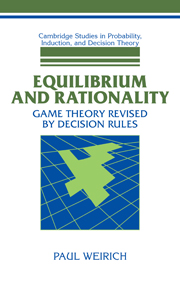4 - Reasons and Incentives
Published online by Cambridge University Press: 18 March 2010
Summary
This chapter formulates a principle of rational decision expressing the view that a rational decision is self-supporting. It distinguishes self-support from incentive-proof ness and argues that incentive-proofness is not necessary for a rational decision since pursuit of some incentives is futile. The pertinent type of futility is cognitive rather than causal. Pursuit of an incentive is cognitively futile if pursuing it yields no escape from the cognitive state of having an incentive to pursue. This is the case if pursuit of the incentive is part of a pattern of endless pursuit of incentives, a pattern that arises, for instance, if pursuing any incentive undermines the cognitive grounds for the incentive and generates a new incentive.
FUTILE PURSUIT OF INCENTIVES
Suppose that someone is playing an ideal version of Matching Pennies and is seeking a match. It is impossible for him to randomize his choice by, say, flipping his penny, and he knows that his opponent can anticipate his choice by replicating his reasoning for it. He is considering showing Heads but has the following reason for showing Tails instead: If I show Heads, then my opponent will have anticipated my choice and will show Tails, so my payoff would be higher if I were to show Tails instead. This reason for showing Tails instead of Heads is obviously not sufficient, for there is a similar reason for showing Heads instead of Tails. Having an incentive to switch from one option to another is not in general a sufficient reason for making the switch.
As we learn from an ideal version of Matching Pennies, an incentive to switch strategies is not a sufficient reason to switch.
- Type
- Chapter
- Information
- Equilibrium and RationalityGame Theory Revised by Decision Rules, pp. 74 - 129Publisher: Cambridge University PressPrint publication year: 1998



